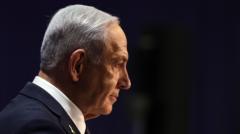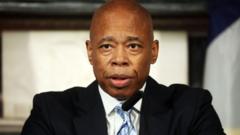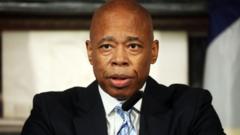Amid escalating tensions and protests, Israeli PM Benjamin Netanyahu accuses police of holding his associates as hostages after their arrests in the controversial "Qatar-gate" investigation, claiming it is a smear campaign against Qatar.
Netanyahu Slams Qatar Investigation as 'Political Witch Hunt'

Netanyahu Slams Qatar Investigation as 'Political Witch Hunt'
Israeli Prime Minister decries arrests of aides over alleged Qatar ties.
Israeli Prime Minister Benjamin Netanyahu has vehemently condemned a police investigation linked to his aides and Qatar as a politically motivated "witch hunt" after he provided testimony related to the case. The investigation, dubbed "Qatar-gate," has seen the arrest of two of Netanyahu's close associates, including adviser Yonatan Urich and former spokesman Eli Feldstein, amid allegations of foreign agent connections, money laundering, and bribery. Both men have denied any wrongdoing.
Netanyahu, while not officially named as a suspect, described their detention as unjust and stated, "There is no case." His comments come amidst escalating protests in Israel regarding various governmental policies, including recent military actions in Gaza and changes to the judiciary. The police have withheld details about the investigation due to a court-imposed gag order, but it has been revealed that Urich and Feldstein are being investigated for alleged efforts to promote Qatar's interests while adversely portraying Egypt's role in Gaza.
During a recent court hearing, a judge deemed there were ample reasons to prolong the detainment of Urich and Feldstein for further inquiry, responding to the police's request. The judge indicated suspicion of a financial connection involving monetary payments routed through a U.S. lobbying firm to promote a favorable image of Qatar—turning from his earlier commentary, Netanyahu expressed disbelief at the politicization of the investigation, explaining the emotional toll on Urich and Feldstein.
Netanyahu's Likud party has alleged that the legal case is a fabrication intended to coerce false testimony through intimidation, as arrests were made following his inquiry to police about their possible connections to Qatar. While officials maintain that investigations are necessary, a Qatari representative dismissed the claims as baseless accusations designed to undermine the Gulf nation's mediation efforts, especially amidst current conflicts.
The troubling backdrop of rising tensions highlights Netanyahu’s leadership challenges, as his government faces widespread public discontent over national security and judicial integrity. The Supreme Court's interim hold on the dismissal of Israel's internal security agency chief—fired on suspicion of neglecting national defense—adds further complexity to the political landscape.
As the investigation continues to unfold, Netanyahu's administration appears caught between maintaining its political position while striving to stabilize relations amid ongoing threats from Hamas and the broader regional implications associated with Qatar's involvement in Israeli-Palestinian affairs.





















